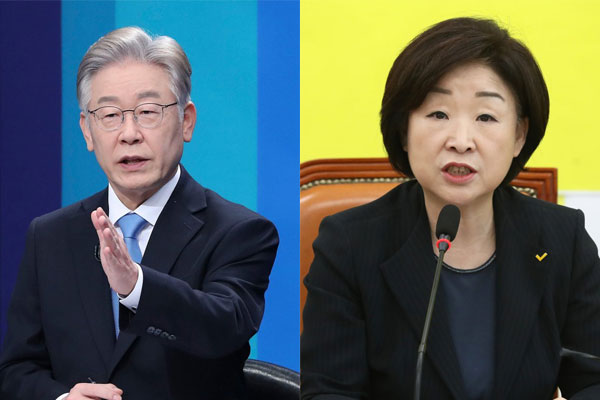Lee and Shim promise more of the Moon administration’s failed policies
The leading four presidential candidates have a clear divide on how they hope to address the North Korean nuclear issue. The two leftist candidates, including Lee Jae-myung from the ruling Democratic Party (DP), hold views that are almost identical to the current Moon Jae-in administration, which has been criticized for its unrealistic optimism about relations with Pyongyang.
The Moon administration’s so-called Korean Peninsula Peace Process policy aims to create peace by declaring an end to the Korean War. It appears to be going all-in on an official declaration to end the war before Moon’s term ends in May, although North Korea has continued to develop nuclear and missile programs and conduct grave human rights abuses. It is troubling to many conservative experts in South Korea that the top candidate from the liberal camp shares the same thinking as President Moon when it comes to North Korea and the declaration of the end of the war in particular.
The JoongAng Ilbo newspaper interviewed four presidential candidates with approval ratings over 5 percent from November 29 to December 4. The survey showed that Lee Jae-myung from the DP and Shim Sang-jung from the minor leftist Justice Party favored declaring an end to the Korean War.
“We need to push ahead with the declaration to end the war as an initial measure to move toward a roadmap of signing the peace treaty,” Lee argued. Lee said he agrees with the Moon administration and sees the declaration as a political statement with no legally binding power. “There will be no changes to the UN Command and the U.S. forces even after the declaration.”
On the other hand, Yoon Seok-yeol, the former Prosecutor General and the presidential candidate of the conservative opposition People Power Party (PPP), and Ahn Cheol-soo from the moderate People Party argued that the declaration is premature.
“There is no national consensus on this issue, North Korea is advancing its nuclear program, and separating the declaration to end of the war from a peace treaty would create negative side effects later on,” Yoon said. “I think we can start discussing the declaration once North Korea takes practical measures toward denuclearization. However, I think it is premature to declare it at this point.”
Yoon argued that the declaration would create a chaotic situation because a political declaration ending the war coexists with the legally established armistice system. “North Korea, China, and some from South Korea can raise an issue of the status of the UN Command and U.S. forces, and it can divide people and weaken the alliance with the United States,” Yoon said.
Ahn Cheol-soo also argued that the declaration would just be a piece of paper that lacks practical and historical meaning.
Lee argued that the declaration would help build trust with North Korea and have a positive impact on speeding up denuclearization and establishing a peace regime. Yoon, however, said that this is just “wishful thinking.” Yoon pointed out the fact that North Korea never asked for the declaration as a precondition to denuclearization and said that Pyongyang can take advantage of the declaration by asking for sanctions relief without taking any measures toward denuclearization.
Lee and Shim also support removing some of the sanctions against North Korea.
“I would like to take a policy that would simultaneously exchange sanctions relief with North Korea’s measures toward denuclearization,” Lee said. “I want to take a phased approach while applying so-called snapback measures.” The snapback approach refers to easing sanctions at first and then toughening them if North Korea violates its obligations.
Shim also expressed similar views. She said, “in order to prevent North Korea from further developing its nuclear arsenal, we need to exchange sanctions relief with North Korea freezing its nuclear program.” She explained that this should be a step-by-step approach, which is the same approach that South Korea and the United States tried to use for decades without success.
Yoon Seok-yeol and Ahn Cheol-soo countered that sanctions relief should not come before North Korea’s denuclearization.
“Sanctions against North Korea, the UN Security Council’s sanctions in particular, should not be waived or lifted recklessly before practical measures toward denuclearization are taken,” Yoon said. He also argued that the snapback approach that Lee Jae-myung is considering would be difficult. “When considering the current relations between the United States and China, and the United States and Russia, I do not think restoring sanctions that are removed would be easy at the UN Security Council.”
Ahn argued that the reason why the international community is sanctioning North Korea is its nuclear program that violates international norms.
The candidates also expressed different views on the joint military exercises with the United States. Yoon argued that “suspending the joint military exercises would weaken the defense posture and the alliance with the United States, so I cannot accept it.”
Ahn said that the issue of the joint military exercises is a sovereign issue, and that the drills’ purpose is to maintain self-defense capability. He said this issue can be reconsidered only after North Korean nuclear and missile threats are removed and Pyongyang refrains from provocations.
Lee Jae-myung, on the other hand, argued that the drills are a point that the South Korean government and the U.S. government should coordinate closely on. Lee reportedly agrees with the Moon administration’s policy of reducing the scale of the joint military exercises to resume talks with North Korea.
Leftist Shim Sang-jung argued that “joint military exercises that North Korea can interpret as hostile and threatening should be stopped.” She added that the purpose of the exercises should be fully reviewed in order to change them into a peacekeeping mission.
Leftists appear to be favoring a soft approach to North Korea while supporting policies that could harm the U.S.-ROK alliance.


